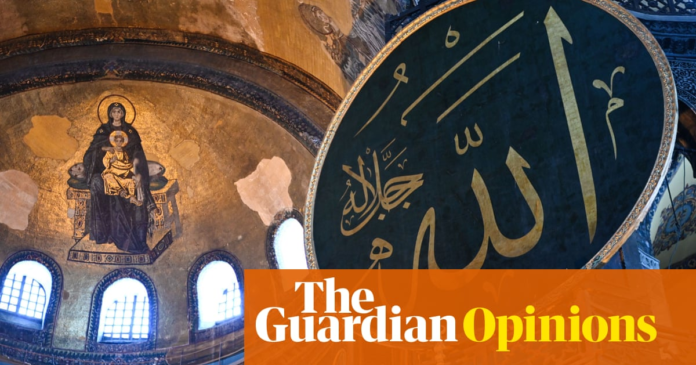Please bookmark for future updates
Despite some theological differences, both denominations look to her as an inspiration for cultivating compassion and hope
I had just finished teaching a class on “the Muslim Mary”. Many non-Muslims who attended were puzzled to find out that Muslims had a connection with Mary at all, and had no knowledge of how important she is to our belief and practice. This came as no surprise. Half of Americans report they know “not much” or “nothing at all” about Islam.
As a Muslim girl growing up in the overwhelmingly Catholic state of Rhineland-Palatinate in Germany, Mary was a constant presence in my life. Her images and statues, dotted across my city, smiled at me as I walked to school. At Christmas time, I joined with my classmates to sing songs such as Stille Nacht, heilige Nacht.
At home and in the mosque, I was fascinated to learn about Mary’s exceptional character, courage and devotion. She is one of the most honoured women in Islam and the Qur’an dedicates the entire chapter 19 to show her high status. She is special, not only because she was the mother of Jesus but because of her exemplary spirituality, worship and service to God.
For me and many Muslims, she remains a role model of how to cultivate moral character, trust and hope in God in times of despair. She demonstrates that in uncertainty, there is also possibility. Mary was faced with so many struggles, yet she persisted. As a young woman who experienced many obstacles because of my Muslim headscarf, Mary encouraged me not to surrender to prejudice and stereotypes. Like her, I pressed forward in finding my place in the world.
As I grew older, I continued to listen to Muslim Christmas songs with my daughters, one of whom I named Maryam – Mary’s Arabic name in the Qur’an. In naming my daughter after Mary, I prayed that she too would embody her piety and those beautiful virtues of compassion, humility, courage and hope.
Mary’s presence is visible in many parts of the Muslim world. The mihrab – the wall structure in every mosque that points in the direction of the Kaaba in Mecca, the shared focal point for Muslims in prayer – is also the name of Mary’s private sanctuary room as mentioned in the Qur’an.
Often I would take my students to Mother Mary’s House (Meryem Ana Evi), a pilgrimage site in Turkey where Muslims and Christians honour this holy figure. We would of course also visit the Hagia Sophia in Istanbul and look up at Mary, who watches over all the worshippers who enter the mosque for prayer. Out of respect to Islamic monotheism, which does not allow any images or statues, Mary’s beautiful painting is typically covered during prayer times.
Mosques in the United States take pride in naming themselves after Mary and Jesus. The Maryum Islamic Center in Maryland, the Maryam Islamic Center in Texas and the Jesus, Son of Mary mosque in New York – all point to the sacred connections between Islam and Christianity.
Mary is a symbol of the enduring relationship between the Abrahamic religions. The Qur’an recognises that she was raised within the foundations of the Jewish faith and that Jesus was the promised messiah. Qur’anic inscriptions on Mary and Jesus found in the Dome of the Rock from the seventh century express points of connection between religions while maintaining Islam’s theological distinctions.
While getting to know more about the Christian Mary throughout my life, I have not compromised my own Muslim beliefs or glossed over those important theological differences. For Christians, Mary remains the mother of God (Theotokos) and occupies a high position in the idea of “God made flesh”. Muslims, however, see her as the mother of the Prophet Jesus, who is fully human and not God incarnate. Her significance comes from her own traits, such as her purity and devotion. I learned to live with healthy disagreement and affirmed those unresolvable tensions.
Similarly, in exploring the Muslim portrayal of Mary, I hope that my students left my class with a richer and greater appreciation of her spiritual legacy. We all agreed about her expansive compassion and her embodiment of hope.
Christians and Muslims together make up more than half of the world’s population. I hope that we can honour Mary together in working for more mutual understanding and the betterment of our human family.
Zeyneb Sayılgan is the Muslim Scholar at the Institute for Islamic, Christian and Jewish Studies in Baltimore
Do you have an opinion on the issues raised in this article? If you would like to submit a response of up to 300 words by email to be considered for publication in our letters section, please click here.
Create an account
Welcome! Register for an account
A password will be e-mailed to you.
Password recovery
Recover your password
A password will be e-mailed to you.
Thursday, December 26, 2024

